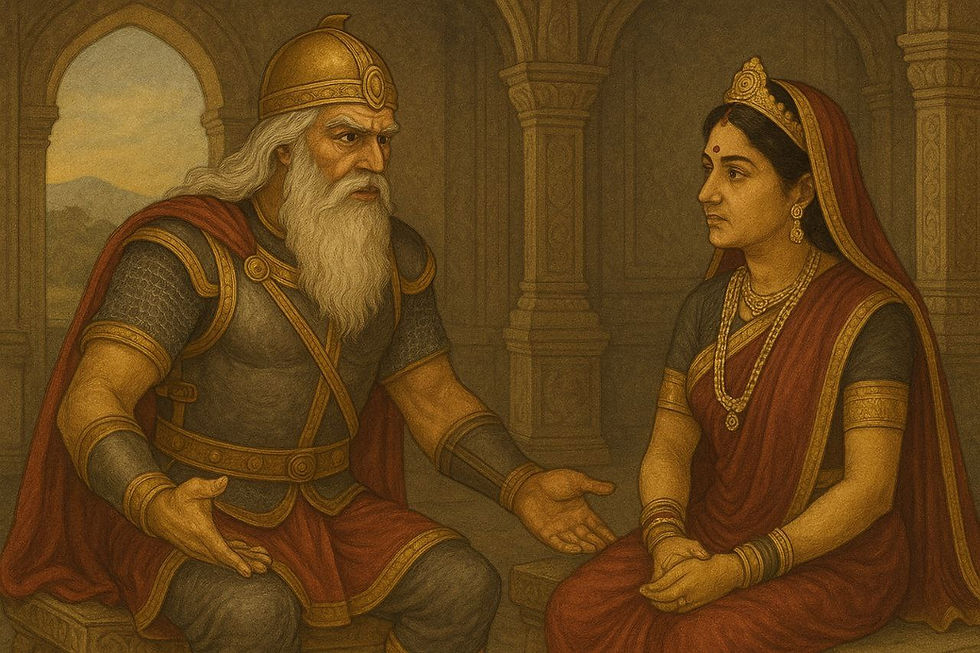Consent to the Niyoga Tradition (Mahabharata Series 10)
- Dheemahi Connect

- Aug 12, 2025
- 3 min read
After much deliberation, Bhishma succeeded in convincing Satyavati and the other elders of the Kuru court to adopt the ancient practice of Niyoga for continuing the Bharata lineage. The Manusmriti prescribes the rules for this sacred duty:
"When a man is appointed to unite with a widow for the sake of producing an heir, he should anoint himself with ghee, speak no words during the act, and father only one son — never more than that."
"Once the son is begotten, the relationship between them must be as between a father-in-law and daughter-in-law, without any further intimacy."
With this decision made, the search for a suitable man for the task began. Satyavati then recalled a truth she had kept hidden from the world — she already had a son by the great sage Parashara, a son who was a Brahmarshi by birth. She decided to reveal this to Bhishma.
Satyavati spoke: "Long ago, I served my father in his work of ferrying people across the Yamuna. We took no payment — it was our family’s dharma. One day, the venerable sage Parashara boarded my boat. Midway across the river, his heart was drawn towards me. He revealed his name, spoke gentle words, and expressed his wish to unite with me. His divine radiance left me unable to resist. He caused a mist to fall over the river so none would see us, and in that auspicious moment, he blessed me with a son — immediately born, without the usual nine months of pregnancy. He ensured my maidenhood remained untouched in the eyes of society and removed the fish-like scent from my body, replacing it with divine fragrance. The boy was born on an island in the river and thus named Dwaipayana."

"Later, he became renowned as Vyasa, for he divided the Vedas into the four parts — Rig, Yajur, Sama, and Atharva — so all could study them. His dark complexion earned him the name Krishna Dwaipayana. Before departing with his father for penance, he told me, ‘Mother, in times of trouble, remember me and I shall come to you immediately.’"
Satyavati then turned to Bhishma and said, "If you agree, I shall summon my son. By his grace, the widows of Vichitravirya will bear virtuous heirs for the Kuru line."
Bhishma, overjoyed at hearing Vyasa’s name, readily consented. Satyavati remembered her son, and at once, Vyasa — wise, steadfast, and master of the Vedas — arrived. She welcomed him with the traditional offerings of arghya and padya, embraced him, and wept tears of joy. Vyasa wiped her tears and said humbly, "Mother, I have come to fulfill your wish. Speak, and I shall do it."
Satyavati explained the crisis: Bhishma’s vow, Vichitravirya’s marriage, his untimely death without an heir, and the need to continue the Bharata lineage. She asked him to bless the king’s widows with sons. Vyasa agreed but said, "They must undertake a year-long vow of purity before coming to me."
Satyavati pleaded for urgency, saying, "The throne cannot remain empty. Without a king, the people will suffer, sacrifices will not be performed, rains may fail, and famine will strike. Let the widows conceive without delay — Bhishma will protect the realm until the princes grow up."
Vyasa agreed, but warned, "If they come to me so soon, they must endure my appearance — my dark skin, my unkempt matted hair, the roughness of my ascetic life, and the strong odour of the forest. If they can accept this, then let Ambika, the elder queen, prepare herself tonight in the bridal chamber. I shall come."
Satyavati then called Ambika and explained the dire situation of the Chandra dynasty, her plan to employ Niyoga, and the role of Vyasa. At first, Ambika refused. Satyavati spoke at length on dharma and history, finally persuading her to agree to the union.
Thus, the stage was set for the next chapter in the destiny of the Bharatas.
Read more timeless Mahabharata retellings in the next issue of Dheemahi Magazine.#Mahabharata #Vyasa #Bhishma #Satyavati #DheemahiMagazine #KuruDynasty





Comments